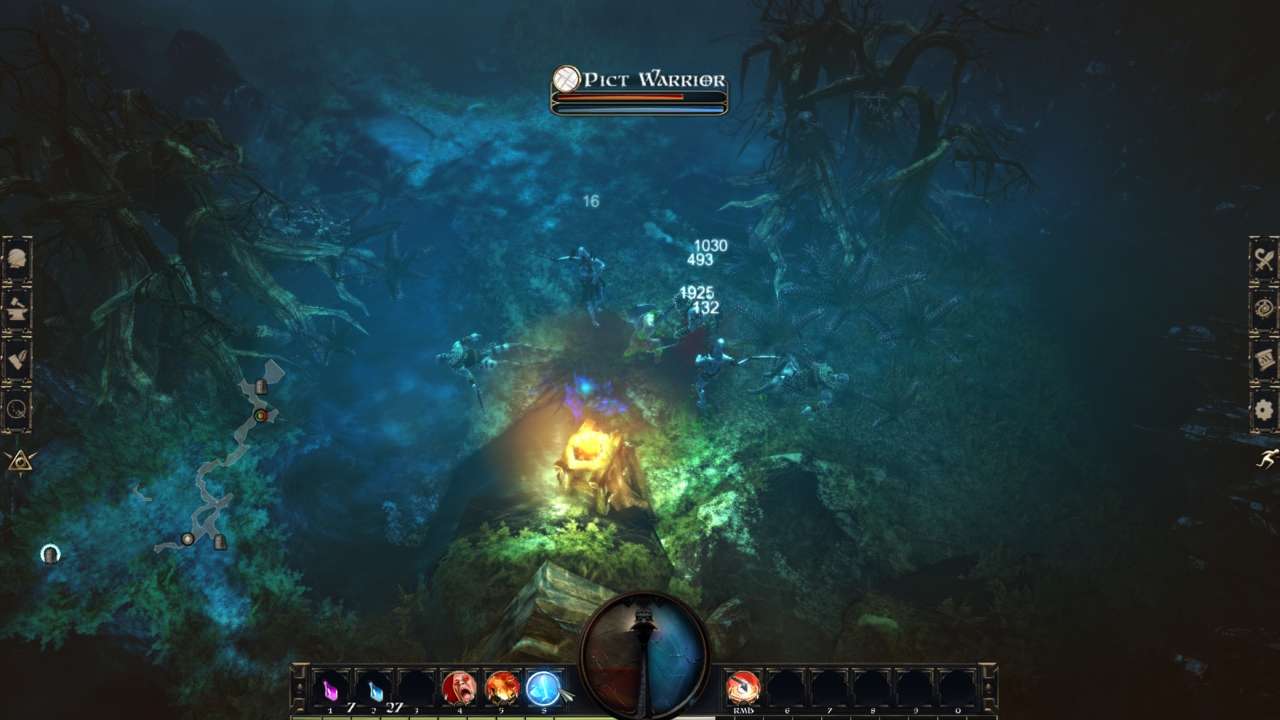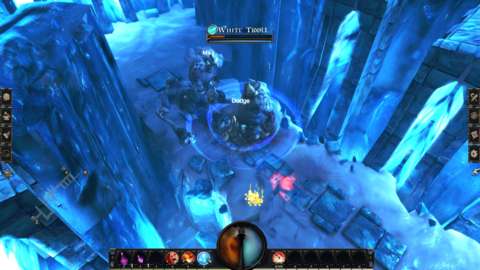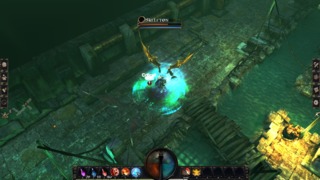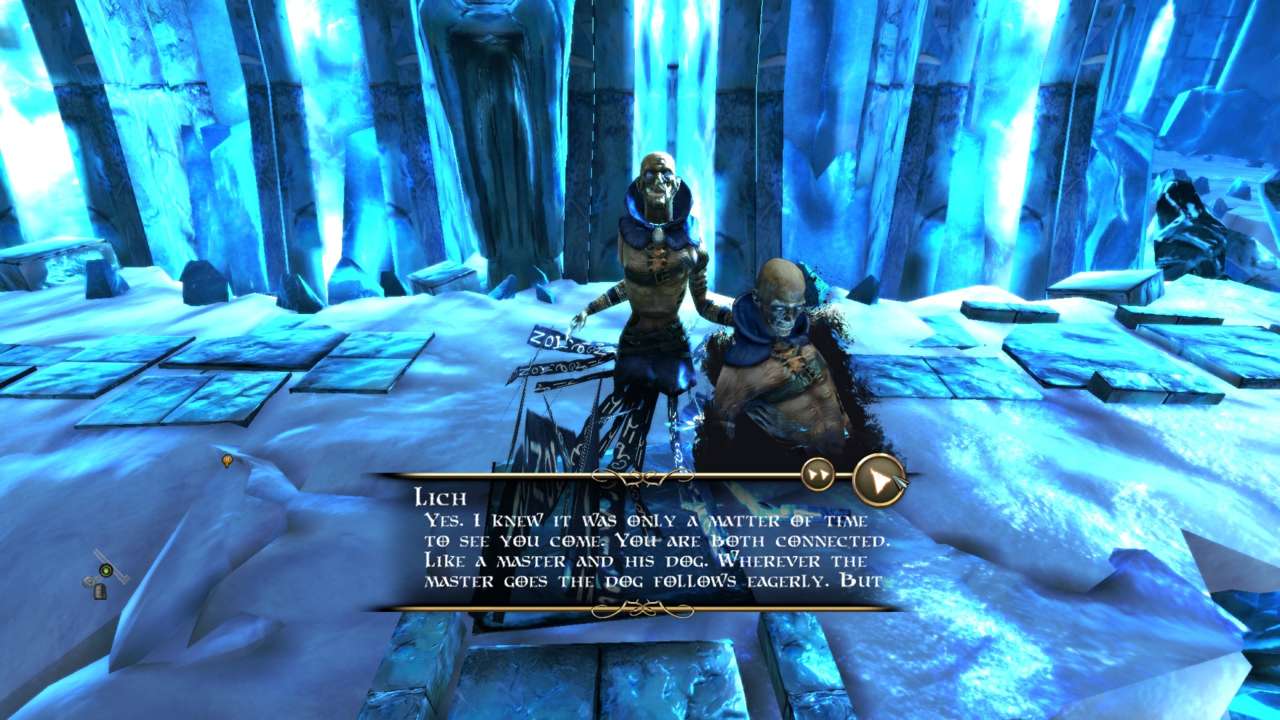Unless I really luck out at a thrift store, I can't get Diablo III for $15. But that amount of spare change does get me Iesabel, a terribly named and somewhat flawed knockoff originally released for iOS and Android that still pushes a fair number of the right buttons when it comes to clickfesty role-playing. As irksome as its story issues and numerous bugs are, the core design hits that hard-to-find balance between killing monsters and gearing up with eternally improving loot drops. Furthermore, the zippy level progression makes you feel like you're accomplishing something more than just pounding on a mouse for hours on end.
The plot is unintelligible in both the single-player and co-op multiplayer portions of the game (and don't expect to get much mileage out of the multiplayer since there is no matching system or lobby, which prevents you from firing up the game and randomly finding some buddies online). The story is impossible to follow, and the dialogue is poorly translated nonsense.

I think I was some kind of world-saving chosen one, and I know that I murdered a lot of evil monsters, scooped up lots of loot, and ground my way through dozens of levels loaded with super creeps and weirdo non-player characters, some of whom came complete with makeup reminiscent of the worst of 1960s Star Trek. But beyond that, nada. Everything is so off-kilter that the game takes on a surreal tone. Weird conversations could have been assembled by someone drawing random words out of a bag. A school of skills has been labeled "ethnic." One of the witch's ability descriptions tells you how it allows you to better use "blunts."
Thankfully, basic game mechanics are so well done and the game menus are so well laid out that you can ignore the plot entirely. First, your heroic character choices consist of either a pre-rolled barbarian or a pre-rolled witch. Both have access to the same stats for things like strength and dexterity and the same general skill categories that let you choose and buff special attacks like battle charges and summoning spells, and background abilities like armor mastery and two-handed weapon proficiency. You gain points for stats and skills every time you level up, which happens frequently, allowing you to customize your hero not long after you get out of the starting gate.
The musical score is a mix of '70s-style progressive rock, offbeat folk complete with spooky chants, and moody techno-flavored tunes reminiscent of early Tangerine Dream.
Campaign progression is equally simplistic. Evil thoughts and evil doings are afoot. As the chosen one, you must solve all the world's ills, so you get quests that are spread across three pretty lengthy acts (expect to take over 20 hours to finish the entire saga) in varied locales like jungles, crypts, deserts, and glaciers. Settings are well realized, with a lot of fine details and a minimum of repetition, although the budget nature of the game comes to the fore in such things as overdone bloom effects that make everything look radioactive and the inability to zoom in the camera. But the main issue with level structure is that far too many of the levels have been laid out like lazy rivers, for the clear purpose of lengthening the campaign. You follow narrow pathways that lead here, there, and everywhere before finally reaching a destination. At times they lead you on for ages only to stop abruptly at dead ends. This leads to enough delays that you occasionally feel like a kid in the backseat asking, "Are we there yet?"

Combat is the usual click-heavy affair where you beat on monsters through liberal use of the left and right mouse buttons. Once you're locked on to a foe, you can just hold the mouse button down when hovering the cursor over the main attack icon, which works well given the gangs of enemy goons you face. Special attacks and actions can be locked to other quick keys, letting you easily rip off berserker rampages and spell blasts, or chug a potion or three. Coordinate your combat by keeping an eye on the levels of your health and mana (used here to power witch spells and barbarian special abilities), and you've got a no-muss, no-fuss role-playing game system that harks back to the original Diablo.
Everything moves quickly, maintaining a rhythm where you kill, gather loot, and move on without any hitches or pauses to interfere with the hypnotic effect that the better clickfest RPGs have on gamers. The rogues' gallery of foes is limited, however, consisting of mostly generic fantasy creatures like skeletons, goblins, zombies, giant spiders, and wolves, along with oddballs like Pict warriors and norns. Monster repetition within each of the campaign's three acts causes scraps to get old long before you near the finish mark.

Loot drops follow a logical progression. You never get bored with the goodies, since they steadily improve the deeper you go into the game. At the same time, this isn't a Monty Haul campaign. When you come across a legendary item with big-time buffing powers, you're always pretty excited to equip it. And you level up frequently. Spend about 10 minutes plowing through a quest, and you will level up at least once or twice, which keeps you tweaking your stats. The flow overall is excellent, with action that never drags or races forward too fast.
The audio quality deserves special mention. The music is often brilliant. The musical score is a mix of '70s-style progressive rock, offbeat folk complete with spooky chants, and moody techno-flavored tunes reminiscent of early Tangerine Dream. There is little repetition here. You hear the same songs every so often, but they're spread out far enough that you enjoy hearing them again when the playlist circles back around. Sound effects include atmospheric noises like wind on the glaciers and buzzing flies in the swamps. Still, there are a couple of drawbacks. The same tinny clash of metal on metal during battles is grating no matter what sort of foe you're fighting. And the voice samples for both the barbarian and the witch are hilariously bad. The husky-voiced barbarian, for example, sounds like the Hulk imitating Batman while working at a phone-sex line.

Finally, there are some bugs. While Iesabel never crashed on me, it was far from stable. Fighting an enemy frequently didn't trigger its hit-point display, which had me fighting in the dark. This hamstrung me in hard fights where I was racing between killing baddies and going down myself, leaving me without a clue whether I could survive without quaffing a healing potion. My hero sometimes got stuck on the scenery, forcing a quick drop out to the main menu and a restart. Since the game uses save points over a save-on-demand system, this knocked me back a ways on a couple of occasions. I had a similar problem if I was attacked at the same time that I neared the exit of a level. Whenever I chose to say no to the question of moving on and not exit the level so I could get into the fight, my hero froze in place and took damage helplessly until killed. Spell effects got stuck on one occasion, too. At the start of the second act, I was hit with hit-point and mana drains that prevented me from regenerating health between battles and launching special attacks. By the time I realized that this was a bug and not part of the game, I'd depleted my entire stock of health potions just staying alive.
Even though Iesabel is the classic good-news, bad-news game with a lot of negatives to tip the scales against its positives, the game has got it where it counts. That isn't a ticker-tape parade of a recommendation, and this certainly isn't a ticker-tape parade of a game. But for just $15, you get a couple of dozen hours of mostly enjoyable Diablo-styled hacking and slashing that is just well crafted enough to make you overlook the lunacy of the story and the aggravation of the bugs.